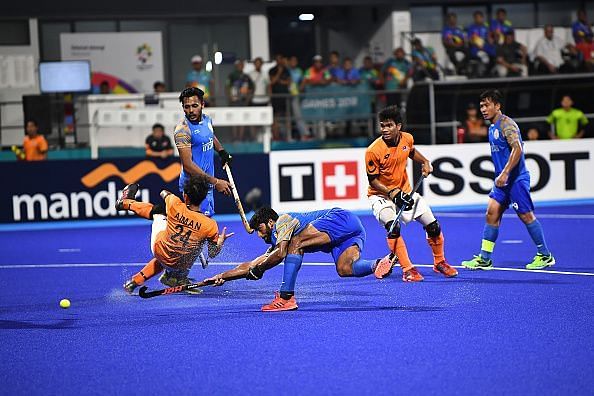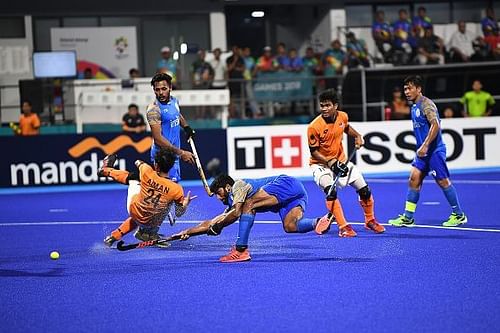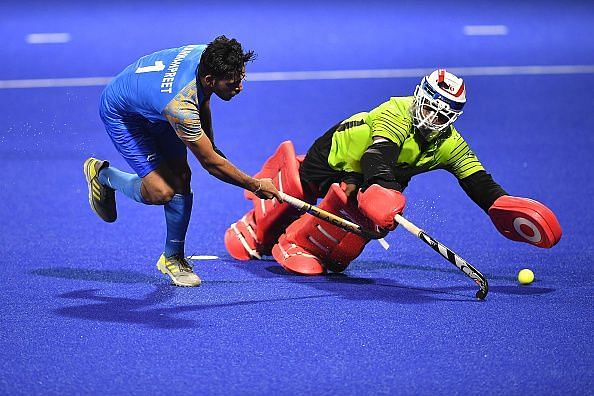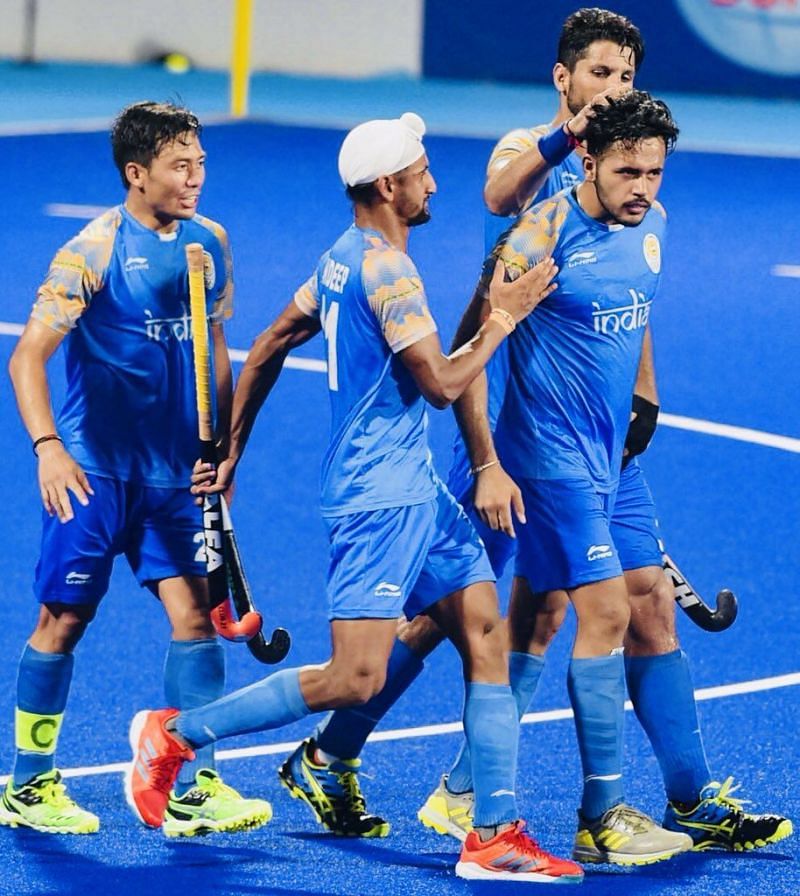
Asian Games 2018: Harsh reality check for Indian men's hockey team ahead of World Cup

India's loss to Malaysia in the Asian Games semifinal may have been embarrassing, and also disastrous considering that they now have to traverse a roundabout route to qualify for the Tokyo Olympics - but it will be less than accurate to term the defeat as either shocking or surprising.
Malaysia's biggest successes in recent times have been achieved in big matches against the Indians, and yet again, at Jakarta, Stephen van Huizen's side stole the thunder from Harendra Singh's rampaging boys who had, until then, scored 76 goals in five matches and were looking quite invincible.
Malaysia - the dark horses of Asian hockey
Pool D might well be the Group of Death at Bhubaneswar, as four sides packed with quality find themselves drawn together and come what may, one of them will not make it to the quarterfinals.
European powerhouses Netherlands and Germany find themselves grouped with Asian challengers Pakistan and Malaysia, and a battle royale will be on the cards as only the pool topper will gain direct entry into the quarterfinals of the World Cup.
The teams which finish second and third will have a chance to progress via the crossovers, and following Malaysia's silver-medal winning finish at Jakarta, it will indeed be interesting to see which of the teams make it through.
The Malaysians are in the World Cup thanks to India - as their victory over Roelant Oltman's side by a 3-2 margin the quarterfinals of the Hockey World League ensured them a ticket to Bhubaneswar.
The Malaysians also have the Indians to thank for the only two silver medals which they have earned at the Asian Games by virtue of beating Harendra Singh's team in the semifinals of 2010, and again in 2018.
Malaysia has always been the dark horse of Asian hockey, and have displayed on numerous occasions that on their day, they can beat just about any side.
All those who were fortunate enough to have watched Akashdeep Singh's scorching tomahawks from the edge of the circle in the pool matches at Jakarta will know just how difficult it is for any goalkeeper to get a pad or glove on those rocket-like reverse hits within a split second.
Yet, Malaysian goalkeeper Kumar Subramaniam did just that to pad Akashdeep's reverse away with the Indian striker firing it in from just over a couple of meters away in a frantic last quarter in the quarterfinals of the Hockey World League Semifinal in June last year.
Ramandeep Singh had been on fire throughout the match, lurking at the goalmouth like a poacher to direct a couple of deft deflections in after the Malaysians had scored two quick goals. Razie Rahim scored off a PC again to give his team a 3-2 lead, and with just over a minute to go, Ramandeep who was positioned behind Kumar received a peach of a pass from Jasjit.
All he had to do was to tap the ball into an open goal, but in a baffling fashion, the in-form striker managed to direct the ball across the face of goal and harmlessly out of the backline instead.
A rueful shake of the head along with Oltmans' trademark smile said it all. Kumar Subramaniam was the goalkeeper of the tournament at London, and two losses to Malaysia in the space of two months (including the Azlan Shah Cup in May), was one of the major reasons why the Dutchman was subsequently shown the door.
The 39-year-old Kumar has been in the Malaysian squad since 1999 - in the vital shootout against India in the semifinal at Jakarta, he showed us exactly why he is often regarded as one of the best goalkeepers in the world.
Stephen van Huizen's side lost to Sjoerd Marijne's chargers at the Asia Cup at Dhaka last October, and also, surprisingly, were thrashed by a highly inexperienced experimental Indian side at the Azlan Shah Cup earlier this year.
The Asia Cup was not particularly vital for the Malaysians as they had already earned a ticket to Bhubaneswar, and the Azlan Shah Cup is just an invitational tournament.
Yet, in the biggest match of them all, and when it really mattered, the Malaysians have yet again struck a deadly blow which means that the carefully-laid plans of the Indian coaching staff are in serious jeopardy.
Razie Rahim was the tormentor at London last year, and he scored a late equalizer to force the semifinal into a shootout at Jakarta too. Brothers Faizal and Fitri Saari split the Indian defence wide open at London and they threatened to do so repeatedly in the Asian Games too.
Azuan Hasan Meor's individual skills are sufficient to send the best defenders in the world into a tizzy and he was just as pacy last year as he was in the semifinal. Tajuddin Tengku was in the team in 2010 when the Malaysians beat Harendra Singh's side at Guangzhou, and he was just as effective when his side repeated the feat at Jakarta.
Indeed, the Malaysian side has never been short of quality and seem to be able to produce something extra against the Indians just as Pakistan did in the past.
Sreejesh and co. were easily the best team in the competition but had they been able to fire in another drag-flick in the semis, the story might well have been different. Unfortunately, the Indians have been unable to get even the injections and stops right and that is cause for concern ahead of the World Cup.

PC stats in big matches less than encouraging
In all, the Indians earned 68 PCs in the tournament and converted 26 with a healthy conversion percentage of 38%, but in the matches that mattered, the conversion rate was dismal.
If one were to disregard the statistics of the matches against the minnows (Indonesia, Hong Kong, and Sri Lanka), and consider the numbers that matter, the picture changes quite dramatically.
Sreejesh's team earned six PCs against Japan and converted one, earned seven against Malaysia and converted two, and earned five against the Koreans without any success. The only saving grace was that in the bronze-medal match against Pakistan, the Indians earned two PCs and Harmanpreet converted the first to give his team the winning goal.
The Indians demolished eventual gold-medalists Japan 8-0 in the pool match, but failed to get the PC injections and stops right time and again, and, unfortunately, the trend continued throughout the tournament.
In the matches against the more established teams, the Indians managed to score just 4 goals from 20 PCs with a 20% conversion rate. Surely not good enough for a team which wishes to stand atop the podium on December 16, at Bhubaneswar, as coach Harendra Singh predicts.
Asian Champions Trophy - one last chance to regain confidence

If the Indians had succeeded in their primary objective of winning gold at Jakarta, next month's Asian Champions Trophy would have been nothing more than a rather insignificant preparatory before the big World Cup, but the Asian Games debacle has changed all that.
Defending champions India will have a point to prove in Oman against the Asian biggies and, for once, the match against Malaysia will be just as crucial as the one against Pakistan for Sreejesh and co. to regain their lost pride and confidence.
The ACT will also be a huge test for Asian Games gold-medalists Japan to prove to themselves and the world that their win at Jakarta was no flash in the pan.
Distraught Indian fans who decided not to watch the Asian Games final did miss a thing or two for sure. When was the last time we witnessed a final with 12 goals being scored in regulation time - and a scoreline which read 6-6?
The Malaysians thought they had their first tournament gold - and a ticket to Tokyo in the bag, when they managed to earn a 4-1 lead in the second quarter, and a 5-2 lead with eleven minutes to play.
A dramatic three goals in just as many minutes by the Japanese restored parity for Siegfried Aikman's side but Malaysia took a 6-5 lead yet again in the 58th minute only for Japan to find an equalizer off a PC after a dramatic referral in the very last minute.
The Japanese won the shootout that followed, and, as such, no team qualified for the Tokyo Olympics via the Asian Games, as hosts Japan won gold in both the men's and women's events.
For their sheer intensity throughout the tournament, the Indian men were no doubt the best team in the Asian Games. The statistics are quite bewildering - the Japanese won the tournament scoring 37 goals with 11 against while the Indians won bronze scoring 80 goals with just six against in regular time!
Despite the loss to Malaysia, the Indians have done exceedingly well in the Champions Trophy and at Jakarta as well.
One loss, however, big cannot change the fact that Harendra Singh is on the right track - one hopes, however, that Hockey India remains supportive of a coach who has made all the right moves thus far.